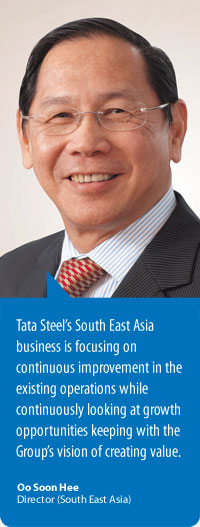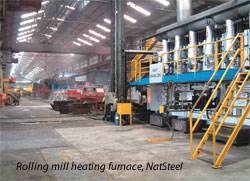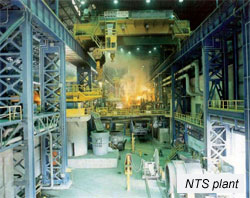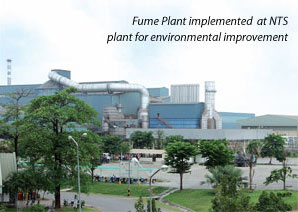Review of operations – South East Asia
South East Asia is amongst the world’s high growth regions. In the year 2007, the region – comprising Thailand, Malaysia, Indonesia, Vietnam, Philippines, Singapore, Laos and Cambodia – consumed about 44 million tonnes of steel. The steel consumption growth rate of the region during the last five years had been around 7% and this growth primarily was led by Vietnam, Indonesia, Thailand and Malaysia.
The region has a population base of around 500 million and the average per capita steel consumption is 90kgs per person. The lower per capita steel consumption with the young demographic profile in these countries presents significant opportunity to further enhance the company’s presence through the pursuit of greenfield and brownfield projects including seeking out merger and acquisition opportunities in both Flat and Long products sectors.
Tata Steel Group’s presence in South East Asia
The presence of the Tata Steel Group in South East Asia is manifested by two
subsidiaries companies:
- NatSteel Asia Pte. Limited
- Tata Steel Thailand Limited - erstwhile Millennium Steel
During the year 2008, the Group’s South East Asian operations contributed USD 2.7 billion to the turnover and generated USD 237 million as Gross Margins with the average ROIC around 16%. The Group’s performance in South East Asia has registered considerable improvement during the last year with increases in both turnover and EBIDTA.
The steel delivery in 2008 was 2.8 million tonnes in the long products segment. The Group has a dominant presence in Singapore with the market share being 65%. Other countries with significant presence are Thailand (31%), Philippines (35%) and Australia (20%).
NatSteel Asia
NatSteel, a 100% subsidiary of the Tata Steel Group, headquartered in Singapore
has a presence in Vietnam, Thailand, Australia, China, Malaysia, Philippines and
Singapore. The Singapore operations consist of steelmaking and rolling operations
of capacity 7,50,000 tonnes per annum and have a well-established downstream
business. The downstream business comprising direct sales to contractors uses knowledge-centric services and consists of a cut and bend facility and products
like mesh, cages and couplers which benefi ts the customers in terms of higher
yields, higher productivity, lesser space requirement and just in time steel in
desired sizes. The downstream facility in Singapore, producing over 4,00,000
tonnes per annum of cut and bend bars, mesh, pre-cages, bore pile cages etc., is
the largest single location facility in the world.
Of the two units operating in China, one is a rolling mill at Xiamen producing about 5,00,000 tonnes of bars and rods and other is a wire drawing plant at Wuxi, with a capacity of 1,00,000 tonnes per year. In the Xiamen city, the market share is about 25%.
In Vietnam, NatSteel is a 55% equity partner in a Joint Venture with VN Steel and a capacity of 1,30,000 tonnes per year. In Australia, the downstream business has a capacity of 2,50,000 tonnes per year. In Philippines, NatSteel is a 40% partner in the Joint Venture with a capacity of 3,50,000 tonnes per year.
The wire drawing plant in Thailand (SIW) produces about 1,20,000 tonnes of wires and with the expansion to be commissioned by this year-end, the capacity will increase to about 1,50,000 tonnes per year. It would be pertinent to note that both the wire operations in Wuxi and in Thailand, export to world-wide markets.
Continuous Improvement
During the past few years, NatSteel’s continuous improvement eff orts have been
focussed on reducing cost, improving productivity and enhancing quality. The
upstream production has gone up from 5,55,000 tonnes in year 2006 to 7,30,000
tonnes in year 2008, an improvement of 32%.
The operations have also shown improvements further adding to effi ciencies. The energy consumption in the Singapore operation’s melt shop and the rolling mills have reduced by over 10% during the past two years. The reduction in energy consumption is on account of oxygen lancing and increasing hot charging amongst other initiatives. Similarly, energy consumption has reduced in other operating units like Vietnam and Xiamen.
Tata Steel Thailand
The Group’s equity in Tata Steel Thailand is 67.1%. Headquartered in Bangkok, its
three main subsidiaries are SISCO, NTS and SCSC.
In the year 2008, Tata Steel Thailand registered sales of 1.4 million tonnes. The
Company’s predominant market is in Thailand and its market share in 2008 was
31% in the long products business.
The Company also has been improving continuously
in the past few years with its various initiatives focused
on reducing cost, improving productivity and quality.
The billet production in SCSC and SISCO increased by
24% in 2008 over 2007.
Tata Steel Thailand is committed to moving forward in
the journey for excellence and social accountability. The
Company continuously improves its business processes
and systems in accordance with its commitment to
environmental responsibilities.
Continuous Improvement Initiatives
Through improvement initiatives, last year, the
Company successfully rolled out the Total Operational
Performance Programme (TOP® Programme) in its
three plants at NTS, SCSC and SISCO. The objective of this programme was to
improve production, quality and reduce cost.
The Company also launched the YATRA project for business process improvement and SAP implementation. In terms of transparency and corporate governance, Tata Steel Thailand has adopted the Tata Code of Conduct and has created awareness on the Tata Code of Conduct amongst all its employees.
In order to improve the company’s business processes, Tata Steel Thailand has decided to implement the Tata Business Excellence Model (TBEM) and the entire top management team has been trained on the TBEM criteria by professionals from Tata Quality Management Services (TQMS).
Based on the new vision and goals for the Tata Steel Group which were launched
recently, Tata Steel Thailand has also created its own vision and goals. This year,
the Company plans to review its brand strategy and launch the initiatives of Retail
Value Management and Channel Finance for increasing the net realisation of its
products and increase its market share.
The other initiatives that have been taken during the year are focussed on reducing power cost, nut coke consumption and alloy consumption.
Tata Steel Thailand is in the process of setting up a mini Blast Furnace of 0.5 mtpa at the NTS rolling mill. The plant is expected to be commissioned by H2-09. With the commissioning of the mini Blast Furnace, the steel shop production is expected to go up and reduce the gap between billet requirement and production.


 South East Asia is amongst the world’s high growth regions. In the year 2007,
the region – comprising Thailand, Malaysia, Indonesia, Vietnam, Philippines,
Singapore, Laos and Cambodia – consumed about 44 million tonnes of steel. The
steel consumption growth rate of the region during the last five years had been
around 7% and this growth primarily was led by Vietnam, Indonesia, Thailand
and Malaysia.
South East Asia is amongst the world’s high growth regions. In the year 2007,
the region – comprising Thailand, Malaysia, Indonesia, Vietnam, Philippines,
Singapore, Laos and Cambodia – consumed about 44 million tonnes of steel. The
steel consumption growth rate of the region during the last five years had been
around 7% and this growth primarily was led by Vietnam, Indonesia, Thailand
and Malaysia. NatSteel, a 100% subsidiary of the Tata Steel Group, headquartered in Singapore
has a presence in Vietnam, Thailand, Australia, China, Malaysia, Philippines and
Singapore. The Singapore operations consist of steelmaking and rolling operations
of capacity 7,50,000 tonnes per annum and have a well-established downstream
business. The downstream business comprising direct sales to contractors uses knowledge-centric services and consists of a cut and bend facility and products
like mesh, cages and couplers which benefi ts the customers in terms of higher
yields, higher productivity, lesser space requirement and just in time steel in
desired sizes. The downstream facility in Singapore, producing over 4,00,000
tonnes per annum of cut and bend bars, mesh, pre-cages, bore pile cages etc., is
the largest single location facility in the world.
NatSteel, a 100% subsidiary of the Tata Steel Group, headquartered in Singapore
has a presence in Vietnam, Thailand, Australia, China, Malaysia, Philippines and
Singapore. The Singapore operations consist of steelmaking and rolling operations
of capacity 7,50,000 tonnes per annum and have a well-established downstream
business. The downstream business comprising direct sales to contractors uses knowledge-centric services and consists of a cut and bend facility and products
like mesh, cages and couplers which benefi ts the customers in terms of higher
yields, higher productivity, lesser space requirement and just in time steel in
desired sizes. The downstream facility in Singapore, producing over 4,00,000
tonnes per annum of cut and bend bars, mesh, pre-cages, bore pile cages etc., is
the largest single location facility in the world. The Group’s equity in Tata Steel Thailand is 67.1%. Headquartered in Bangkok, its
three main subsidiaries are SISCO, NTS and SCSC.
In the year 2008, Tata Steel Thailand registered sales of 1.4 million tonnes. The
Company’s predominant market is in Thailand and its market share in 2008 was
31% in the long products business.
The Group’s equity in Tata Steel Thailand is 67.1%. Headquartered in Bangkok, its
three main subsidiaries are SISCO, NTS and SCSC.
In the year 2008, Tata Steel Thailand registered sales of 1.4 million tonnes. The
Company’s predominant market is in Thailand and its market share in 2008 was
31% in the long products business. Through improvement initiatives, last year, the
Company successfully rolled out the Total Operational
Performance Programme (TOP® Programme) in its
three plants at NTS, SCSC and SISCO. The objective of this programme was to
improve production, quality and reduce cost.
Through improvement initiatives, last year, the
Company successfully rolled out the Total Operational
Performance Programme (TOP® Programme) in its
three plants at NTS, SCSC and SISCO. The objective of this programme was to
improve production, quality and reduce cost.